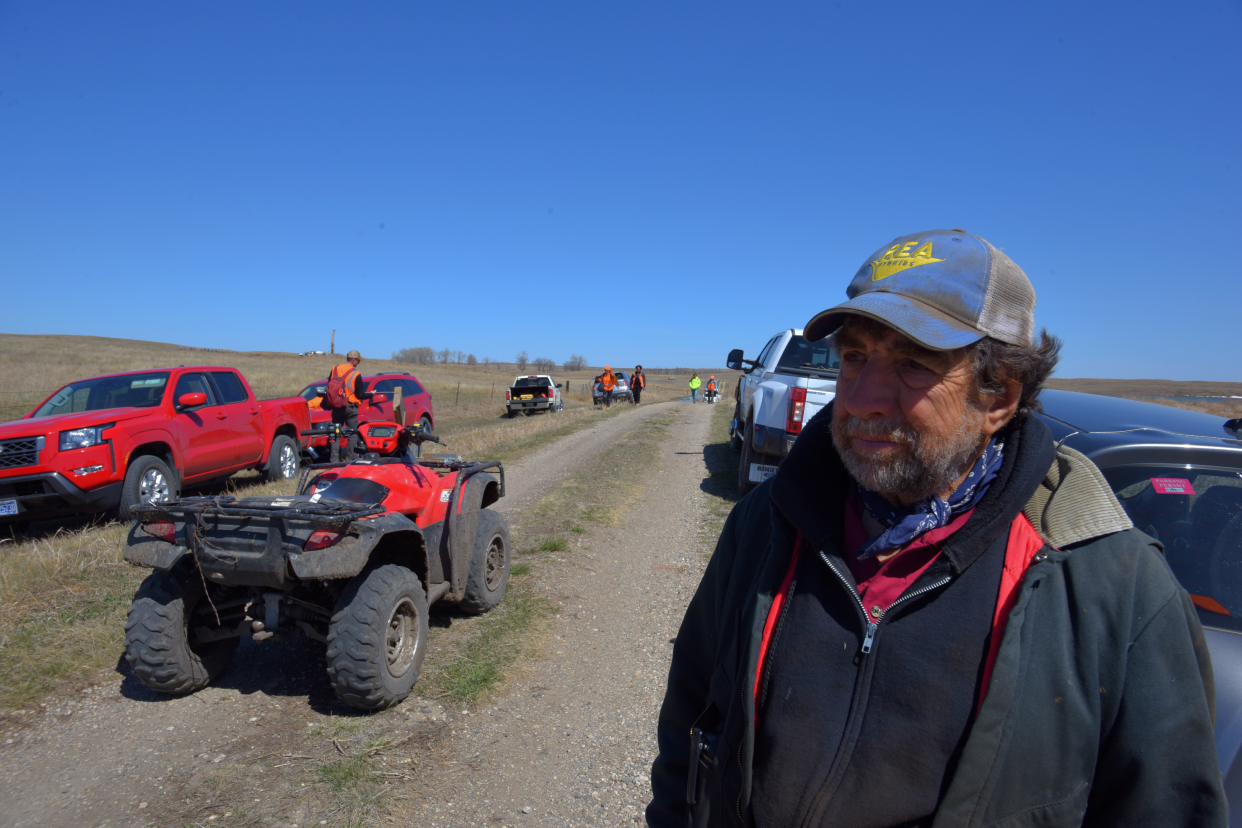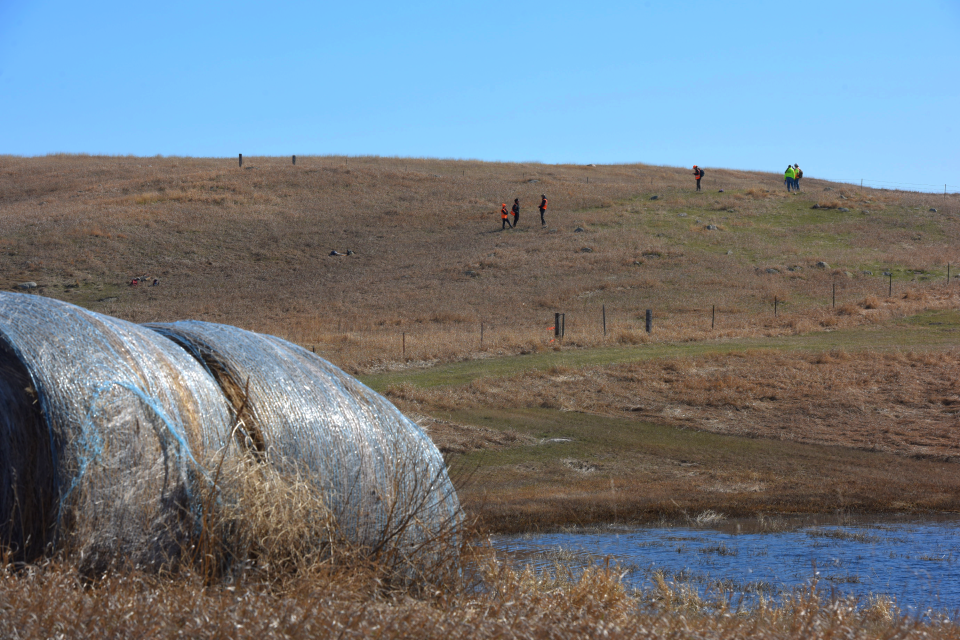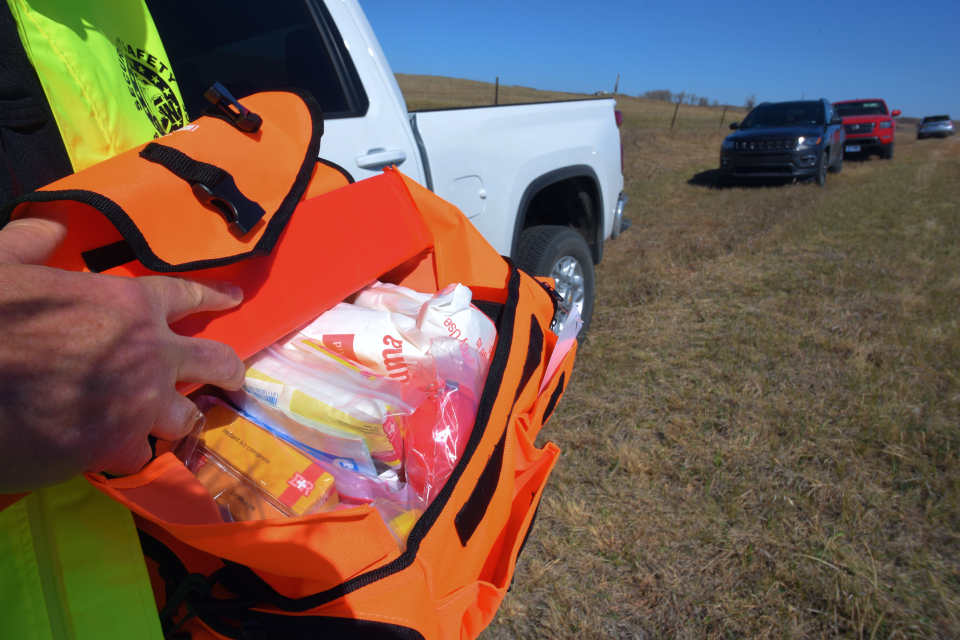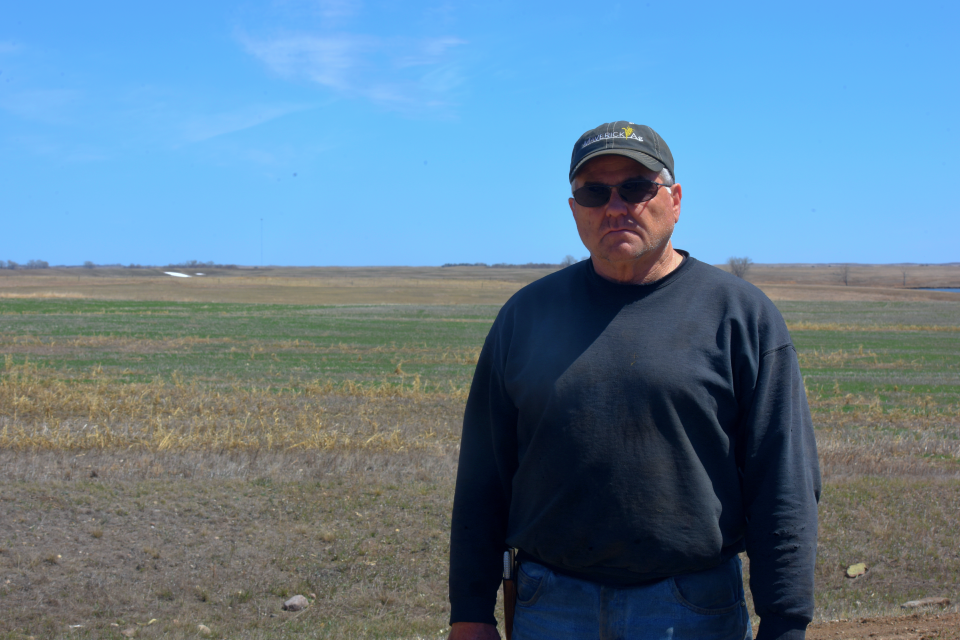Farmers say Summit Carbon Solutions using ‘intimidation’ while targeting McPherson County land

MCPHERSON COUNTY ― When you look into the dust-circled, timeworn eyes of farmer Leo Vilhauer, you can see the emotions wearing on him in the moment. When his gaze pointed toward the Summit Carbon survey crews mapping and drilling on his farmland, you can see the disappointment settle in as unhappy wrinkles spread through the rest of his face.
Since at least May 2, Summit Carbon Solutions has been performing surveys on land belonging to landowners listed in eminent domain claims initiated by the company last month. Engineers accompanied by a security detail have been traveling along the planned route for their $4.5 billion Midwest Carbon Express pipeline, 477.91 miles of which runs through South Dakota.
Vilhauer is one of a sizable group of McPherson County landowners opposed to Summit Carbon's CO2 pipeline project. The county itself is a bastion of anti-carbon sentiment, since about one-third of the Summit's most recent eminent domain lawsuits involve landowners in the area.
Like other McPherson County landowners vehemently opposed to the pipeline, Vilhauer said he has long felt only bitter anger toward the company. But on May 3, when a work crew arrived to conduct route surveys on his property, he said he felt another emotion yet to be spurred by the pipeline battle.
Defeat.
"I'll tell you what: I couldn't sleep last night. I was so upset that they can do this," Vilhauer told the Argus Leader on May 3. "I mean, I pay the taxes. It's my land ― all 10,000 acres ― and they can just do whatever they want."
In an April 21 court order, Fifth Circuit Judge Richard Sommers granted the company's motion for summary judgment to perform the surveys as part of a 2022 civil lawsuit, court documents show. The order permits Summit Carbon to access land belonging to landowners opposed to the project in Brown, Edmunds, McPherson and Spink Counties.
More: Study reveals new data on how Summit Carbon, Navigator pipelines would impact SD's economy
During the last state legislative session, property rights advocates dismayed over the failure of two bills aimed at setting restrictions on carbon pipelines.
But according to McPherson County farmer Mike Klipfel, 250 people showed up in Leola ― a town of only 434 people, according to the latest U.S. Census data ― to rally against CO2 pipelines. With the support of multiple South Dakota legislators in attendance, Klipfel said the battle between property rights advocates and carbon companies remains contentious, especially while Summit Carbon conducts its land surveys.
"There's no doubt that the momentum is growing in favor of us," Klipfel told the Argus Leader on May 15. "This is … just the beginning of private companies being able to take private land for whatever reason they want. If we can get that message out, it will resonate."
'A matter of personal safety'
Vilhauer has been opposed to allowing Summit Carbon on his land since he received his first offer to sign an easement agreement with the company in July 2021. But now that the courts ruled in favor of Summit Carbon, Vilhauer is powerless to do anything to stop them.
"At this point, it's like, 'Why? Why these guys?'" Vilhauer said. "I mean, if a hunter comes and walks on my land without permission, I call authorities and there will be action taken. Here? My hands are tied."
When the Argus Leader arrived on May 3 to the scene of Summit Carbon's survey points in McPherson County, about seven heavy-duty pickup trucks and SUVs were parked on a gravel road adjacent to Vilhauer's land. A survey team made up of about seven people dotted a small hill about 100 feet away from the road.
A project manager working for 3B Inspection, a Texas-based contractor partnered with Summit Carbon, and two security guards stood watch from the road. The guards, employees of OverWatch Enterprises, a security company also licensed out of Texas, wore green hi-vis jackets and black shirts, with the word "SECURITY" emblazoned in bold, white text on the front. They refused to provide their names.

The project manager, who refused to provide their name, told the Argus Leader on May 3 the purpose of the survey crew was to analyze the land along their proposed pipeline route to ensure it doesn't disturb any biologically, civilly, culturally or environmentally sensitive areas.
The Argus Leader reached out to 3B Inspection on May 17 for further comment but did not receive a response. Meanwhile, guards on site mentioned feeling uneasy about the situation and empathy toward landowners.
Asked why it was necessary for security to be present during land surveys, one guard overseeing local traffic initially called it "a matter of personal safety." The guard, who also refused to provide their name, later expressed a sense of anxiety toward the landowners.
"We had a shooting in Texas about, what, a week ago?" the guard said, referencing an April 29 shooting in Montgomery County, Texas, where five people were killed. "You never know when you might run into a more radical landowner."
To Vilhauer, the whole situation reeks of an air of intimidation. When he drives to the nearby town of Leola to grab a bite at the local diner, he said one of the first things people talk about are the Summit Carbon crews "buzzing around."
Vilhauer said he has considered non-violent means of stopping Summit Carbon's engineers from accessing his land, despite the court order. But if the sheriff came to arrest him, he wouldn't be able to plant his crops this year, he said.
Down the road from Vilhauer's place, landowner Dennis Wolff cleans out a semi-truck to get it ready for some delivery trips. He, too, is off-put by the situation.
"The whole reason [security guards] are out there is for intimidation, and it's really an uneasy feeling for people," Wolff said. "They think they're held hostage on their own property."

Rural stereotypes infuriate McPherson County landowners
Mark Lapka, another McPherson County landowner, took issue with the guard's earlier statement. He said some landowners are passionate about their land and the topic of property rights, but he added the "radical" label was a "terrible mischaracterization on their part."
"It works both ways here. You never know," Lapka said. "It's a very emotional issue, and I hope and pray that nothing happens."
That's not to say some people wouldn't go to extremes to protect their land, Vilhauer explained.
Some have floated the idea of bringing a 12-gauge shotgun out to the survey sites to hunt for wildife on their property, Vilhauer said, in an attempt to exercise their own rights and, hopefully, scare off the unwanted visitors.
"One lady from Leola told me … 'You know, if they try to go across my land, I'm going to lay on the road. They're going to have to run me over,'" Vilhauer added.
Other statements include vague threats, like "not letting anyone place one foot on their land."
Vilhauer hopes cooler heads prevail while Summit Carbon conducts its surveys, which the company said should be completed statewide in early summer.
At least one direct threat toward Summit Carbon has been lodged, though, early into the company's latest round of surveys, John Satterfield, Summit Carbon director of regulatory affairs, told the Argus Leader in a statement. He said the company called the Brown County Sheriff's Office after a landowner "threaten[ed] violence" against team members, and the seriousness of the threat "clearly necessitated the company taking this step."
More: 'Killing the first person I see': Brown County farmer allegedly threatens Summit surveyors
Brown County Sheriff Dave Lunzman confirmed a threat was filed but did not provide details. An investigation into the threat is ongoing.
In McPherson County, Sheriff David Ackerman started delivering condemnation proceedings to landowners in May.
He told the Argus Leader on May 9, "emotions are running high," but he said there haven't been any direct threats leveled at survey crews or their security personnel within his jurisdiction.
"There are words that are exchanged, but none that I'm aware of that would refer to doing somebody bodily harm or anything," Ackerman said.
He added landowners have requested survey crews be aware of livestock, since calving season is underway.
"Nobody wants to see anybody get hurt by an overprotective cow," he said.
According to Summit Carbon spokesperson Jesse Harris, the vast majority of surveys do not require security personnel and involve the landowner voluntarily allowing crews to access their property. Harris said there have been past instances where team members received threats of violence from uncooperative landowners.
"In some instances where it has become necessary, the company has made the decision to hire security contractors to ensure the safety of our team members as they complete this important work," Harris said.
Vilhauer was one of the first people to speak directly to the contracted crews May 3, when he questioned how deep they planned to drill to take soil samples on his property.
The Argus Leader observed Vilhauer promptly leave after receiving his answer.
"You can tell word's getting out that Summit's here. Some people driving by will look at you … and you can sometimes see them recording you on their phones," the guard said.
The 3B supervisor, who did not provide their name, maintained 3B Inspections and the security outfit are a third party in the state's landowner-Big Carbon battle.
Lapka acknowledged as much, but he said the rural stereotypes ― ones that label them as uneducated and gun-ho ― iterated by the guard, point to an disconnect that's accepted by Summit Carbon's contractors.
"In order to survive in the current modern agricultural industry, you have to be very business savvy. A lot of them are college educated," Lapka said. "That bothers me when they … make this characterization of a radical landowner because I think there's a disconnect between urban and rural folks in this country that we don't understand each other."
CO2 opposition remains steadfast in McPherson County
During the past year, Summit Carbon has even enticed South Dakota farmers with four- and five-digit payments to sign easement agreements to run the pipeline through their land.
The practice has been fundamental to securing a majority of their route through South Dakota. But McPherson County remains, at least in part, an unsecured objector to the project, and landowners like Wolff continue to be embittered about the whole deal.
Wolff said he wasn't immediately opposed to the project. Like other landowners in Summit Carbon's path, he sat down with a company agent for a one-on-one discussion in early 2022.
Based on Wolff's account of the meeting, the talk centered around the company's willingness to pay about $37,000 to install half a mile of pipeline in a section of his mother's land. Wolff has power of attorney over his mother's financial assets.
More: Some South Dakota farmers resent ethanol industry’s push for carbon pipelines
For Wolff, the money offer was less than ideal, but he said it wasn't the dollar amounts that soured him. He wanted a straightforward deal, but his questions were met with inconsistent answers, he claimed.
Exactly how deep the pipeline would be buried in the land, Wolff said, was the first inconsistency. The agent told him they would put 3 feet of dirt over the installation. Wolff said his tractor can create 3-foot ruts.
When the agent suggested a 4-foot fill, Wolff said he expressed skepticism that, too, would be enough dirt.
"[The Summit Carbon agent] goes 'Well, we'd maybe go to six.' Yeah, well, what is it, you know?" Wolff said. "The contract said 3 feet of fill, but he was just saying things just to get me to sign."
On the money side of things, Wolff said feels vindicated in his mistrust of Summit Carbon's dealings with him. After he turned down the $37,000, he was eventually offered a $200,000 easement contract, which was bumped up to about $210,000 in a final offer letter. Argus Leader observed Wolff's copies of the offer letters.
Each new offer confirmed Wolff's feelings that Summit Carbon wanted to swindle him. But it's not only about the money, he contended. He said the initial offer impugned his sense of pride. He took the lowball offer as a sign the agent was irreverent toward the fifth-generation McPherson County farmer.
Eminent domain threat stokes embers of political opposition
Summit Carbon still needs to acquire a permit from the South Dakota Public Utilities Commission to build its pipeline in the state. The company's permit hearing is scheduled for September, and the topic is starting to gain some early traction among changemakers in the state.
In the South Dakota State Legislature, 20 state representatives and two senators signed on to a letter calling on Gov. Kristi Noem to speak in support of landowners opposed to CO2 pipelines in the state. The Argus Leader reached out to the Governor's Office on May 8 for comment but did not receive a response.
Summit Carbon's eminent domain lawsuits recently sparked outrage from South Dakota Farmers Union, one of the state's main farmer organizations. In a column published on the farmer group's website, SDFU President Doug Sombke called on state legislators and Congressional leaders to stop what's perceived as the "misuse of eminent domain laws."
"Summit Carbon Solutions is a privately held company with millions to lose if they are not able to complete their plans for this CO2 pipeline. They claim eminent domain with the excuse that this pipeline will benefit the public," Sombke wrote. "Summit Carbon Solutions has shown its true colors and it is no friend to farmers or landowners - period."
Previously: Summit files more than 80 eminent domain lawsuits in 9 South Dakota counties
Some counties are also debating new measures to bring CO2 pipelines in line with other transmission projects. Lincoln County has tried to create an ad hoc committee, which could lead to the eventual implementation of a new ordinance that would establish large setbacks for CO2 pipelines on public property. However, Lincoln County Commission failed to acquire enough votes to create the committee on Tuesday, delaying the county from putting CO2 pipelines on the same regulatory foothold as other transmission projects.
On April 24, Minnehaha County Planning and Zoning Commission voted 6-0 to approve a proposed amendment to a zoning ordinance to put CO2 pipelines. County commissioners plan to discuss the wholesale adoption of the amendment on May 23.
Summit Carbon's pipeline boasts a whole host of expected benefits, according to the company's website. If built, the Midwest Carbon Express would be the largest carbon carbon capture and storage project in the world and could sequester "18 million tons of CO2 every year." The company also claims the pipeline would create more than 11,000 temporary jobs during construction and 1,100 permanent jobs once the pipeline is operational.
The company also claims the pipeline would play a part in maintaining commodity prices for corn, benefiting Midwest farmers and the ethanol industry.
'I don't have to deal with bad people ... [but] I have no choice'

Unlike Vilhauer, Wolff wasn't as candid with how the surveys or the court summons he received in the mail weigh on him. Neither did his work-creased face betray any strong emotions similar to Vilhuaer when he spoke to the Argus Leader on May 3.
In truth, though, the prospect of eminent domain is of lesser concern compared to the prospect of time for Wolff. Two weeks ago, Wolff was diagnosed with cancer. Two months ago, his father passed away. Spring planting is off to a slow start for Wolff. Nearby fields remain flooded after the winter snowpack melted in his area ― in that, he is reminded of the planting season of 2018, when he suffered a heart attack during a flash flooding incident.
"This is just another something that we're forced to deal with that is adding stress. It's just something else that stirs the pot," Wolff said. "There's times when I wake up and I think about it, you know. It's always in the back of your mind. It never goes away."
Wolff still thinks about certain moments of his meeting with the Summit Carbon agent. Wolff remembered one instance where the agent told the 65-year-old farmer he would be one of the last people in the county to sign an easement at that point. He found this hard to believe at the time, since none of his rural neighbors mentioned signing such an agreement to him.
But when Wolff was first brought to the bargaining table in early 2022, Summit Carbon had only been a few months into making inroads with landowners.
Sabrina Zenor, director of community relations for Summit Carbon, told members of Sioux Falls Downtown Rotary as much during a May 15 panel discussion the company started signing their first easement agreements in Dec. 2021.
Zenor said the company has signed 70% of its necessary easement agreements in all five states where it runs through. She emphasized the company wants to secure voluntary easements for 100% of its route.
"Eminent domain does not make friends, and if we have friends and then we start using eminent domain, we do not keep friends," Zenor said.
Previously: Summit captures more than 50% of CO2 pipeline easements; critics condemn company's 'strongarm' tactics
Zenor also acknowledged a portion of South Dakota landowners remain opposed to the pipeline project, but she said the company continues to negotiate with landowners to this day.
"Some landowners have decided to stop working with us, and we have to continue the process. If those landowners want to come back to the table, we are here," Zenor said.
In Wolff's case, he declined to sign the initial offer, saying he would run easement agreement by his attorney.
That's when the agent suggested they may consider "condemnation proceedings" if a deal couldn't be struck, Wolff said. The McPherson County farmer said he didn't understand the concept of eminent domain at the time, but he's all too familiar with it now.
"I'm old enough now to where I don't have to deal with bad people. To put it in plain farmer English, I don't like dealing with a******, and I don't have to at this point in my life," Wolff said. "I don't have to, but in this case, I have to. I have no choice."
Dominik Dausch is the agriculture and environment reporter for the Argus Leader and editor of Farm Forum. Follow him on Twitter and Facebook @DomDNP and send news tips to ddausch@gannett.com.
This article originally appeared on Sioux Falls Argus Leader: SD farmers say Summit Carbon using 'intimidation' while surveying

